Dear Audrey
Jeremiah Hayes
2021
| 90 min
Documentary
English
Awards and Festivals
Best Documentary Film Iris Awards - Québec Cinéma, Canada (2023)
Best Editing, Documentary Film Iris Awards - Québec Cinéma, Canada (2023)
Grand Prix Documentary AwardRising Sun International Film Festival, Japan (2022)
Best EditingBrussels World Film Festival, Belgium (2022)
Best of Documentary Feature WinnerIndy Film Festival, Indianapolis, U.S.A. (2022)
Dr. Sydney K. Shapiro Philanthropic AwardPhoenix Film Festival, Arizona, U.S.A. (2022)
Cercle d’or Best Feature Film – DocumentaryFestival cinéma du monde de Sherbrooke, Sherbrooke, Canada (2022)
Silver Winner – Best Feature Documentary Tokyo Film Awards, Tokyo, Japan (2022)
Best Editing of a DocumentaryMadrid International Film Festival, Madrid, Spain (2022)
The Excellence in Editing AwardDocs Without Borders Film Festival (2022)
People's Choice AwardRIDM (Montreal International Documentary Festival), Canada (2021)
Nomination - Ted Rogers Best Feature Length DocumentaryCanadian Screen Awards, Toronto, Canada (2023)
Nomination - Best Editing in a Feature Length DocumentaryCanadian Screen Awards, Toronto, Canada (2023)
Nomination - Best Original Music in a Feature Length DocumentaryCanadian Screen Awards, Toronto, Canada (2023)
Nominated – Best Canadian DocumentaryVancouver Film Critics Circle, Canada (2023)
Nomination - Best Original Score for a Documentary Feature FilmCanadian Screen Music Awards, Canada (2022)
Acclaimed activist-filmmaker Martin Duckworth has devoted his life to peace and justice. But now he’s put down his camera to fight for the most important cause he’s ever faced. While caring for his wife through the final stages of Alzheimer’s disease, Martin’s love deepens as he looks back on an epic life and career.
Trailer
Synopsis
Acclaimed activist-filmmaker Martin Duckworth has devoted his life to peace and justice. But now he’s put down his camera to fight for the most important cause he’s ever faced—caring for his wife, Audrey Schirmer, through the final stages of Alzheimer’s disease. Martin tirelessly embraces each new chapter with grace and resilience, demonstrating his unconditional loyalty as he finds new reasons to love her each day.
Dear Audrey weaves an intricate portrait of the couple’s gritty yet tender reality and takes us back to their adventures, from the front lines of the anti-Vietnam War protests to the hippie counterculture movement, using excerpts from Martin’s films and Audrey’s stunning photography.
The film is a powerful testament to Martin’s love and devotion, which deepens over the decades. While Audrey gradually fades away—and their autistic daughter, Jacqueline, struggles with her mother’s illness—Martin commits everything he’s got to making their lives creative and meaningful.
About Martin and Audrey
Martin Duckworth
Martin Duckworth is an acclaimed Canadian documentary director and cinematographer. Raised during the Great Depression, he began his film career at the age of 30, at the height of the hippie revolution in the sixties. His award-winning films are both artful and socially conscious. Martin travelled the globe, directed 30 films and was the cinematographer for 100—through which he saw the horrors of war in Vietnam, Cambodia, Japan and Afghanistan. In 2015, he was awarded the Government of Quebec’s Prix Albert-Tessier, one of the province’s highest honours, given to individuals who’ve made an outstanding contribution to Quebec cinema.
His credits as director include 12,000 Men and Return to Dresden (Golden Sheaf awards, Yorkton, 1978 and 1986), A Wives’ Tale (Quebec Critics’ Choice, 1980), No More Hiroshima (Genie, 1984), Our Last Days… in Moscow (Best Direction, FIFA, 1987), Oliver Jones in Africa (Ducat, Mannheim, 1990) and Brush with Life (Best Film, Hot Docs, 1994). His cinematography work has included Christopher’s Movie Matinee (Dir. Mort Ransen, 1968), Sad Song of Yellow Skin (Dir. Michael Rubbo, 1970), Le bonhomme (Dir. Pierre Maheu, 1972), La richesse des autres (Dir. Maurice Bulbulian, 1973), Falasha (Dir. Peter Raymont, 1983), La bombe en bonus (Dir. Claire Nadon, Audrey Schirmer, 1986), Between Two Worlds (Dir. Barry Greenwald, 1990), Seeing Red (Dir. Julia Reichert, 1993), Maureen Forrester: The Diva in Winter (Dir. Donald Winkler, 1999), Return to Kandahar (Dir. Paul Jay, 2003), Professor Norman Cornett (Dir. Alanis Obomsawin, 2009), Ma vie réelle (Dir. Magnus Isacsson, 2012) and Granny Power (Dir. Jocelyn Clarke, 2016). He has also worked as a cinematographer with such filmmakers as Gilles Groulx, Don Shebib and Peter Watkins.
Martin is a descendant of Nicholas Austin, one of the first Quakers in the province of Quebec and the founder of Austin, Quebec. He was raised in Montreal’s Notre-Dame-de-Grâce neighbourhood. He went to high school in Halifax, Nova Scotia, and attended Yale University and the University of Toronto for BA and MA degrees in History. His father, Jack Duckworth, was secretary-general of the YMCAs in NDG and Halifax. His mother, Muriel Duckworth, was a distinguished Canadian pacifist and activist. Martin was married to Audrey Schirmer, a photographer and social activist with whom he has collaborated on a range of projects. They have three children together, Nicholas, Jacqueline and Danielle. Martin is also the father of twins from his first marriage, Marya and Sylvia, as well as daughters Natascha and Anana from his second marriage. He continues to be a committed advocate of world peace.
Audrey Schirmer
A social activist and photographer, Audrey Schirmer was born in Springfield, Massachusetts. After graduating from Boston University amid the student uprisings of 1968, she studied photography in New York City and became a freelance photographer on the front lines of the anti-Vietnam War movement.
In addition to numerous collaborations with her husband—documentary filmmaker Martin Duckworth—Audrey staged several exhibitions of her work, notably featuring immigrant children and anti-war movements.
Audrey established the photography department at the Saidye Bronfman Centre in Montreal in 1972, where she taught for 16 years until devoting herself full-time to the care of her autistic daughter, Jacqueline.
Diagnosed with Alzheimer’s disease in 2013, Audrey Schirmer passed away on December 27, 2019.
Director's Statement
My very first job after film school was with Martin Duckworth. It was in 1991, at the National Film Board of Canada, and I was the assistant editor on Martin’s film about the first Gulf War, Peacekeeper at War. From the beginning, Martin’s uncompromising resolve to speak his truth through his films inspired me. We remained in touch ever since, but it wasn’t until four years ago, after his wife, Audrey Schirmer, was diagnosed with Alzheimer’s disease, that our friendship started to grow. Every few weeks, I would go to their house and film them together with their autistic daughter, Jacqueline. At each visit, I was moved by this family’s raw and uncompromising authenticity of character. I had no doubt that this would resonate on film. In the following years, I also learned of the many adventurous—and sometimes tragic—events in Martin’s fascinating life.
Even though Martin had survived a near-fatal car accident in Mexico and witnessed carnage while filming on the front lines of war-torn countries around the world, he remained optimistic. Through hardship and death, Martin has developed a keen sense of the preciousness of every moment of life. This is something I also learned to appreciate after my mother’s prolonged battle with Lou Gehrig’s disease in the nineties. Like Martin, my experiences with illness and death transformed my priorities. Living through this, the ordinary becomes extraordinary.
I’ve made Dear Audrey as a tribute to Audrey, Martin and his family. As we collectively pause during this new COVID era, we rethink what’s important and turn with urgency towards living. In this spirit, Dear Audrey is a timely gift—a reminder of the choices we make and the families we create, and an invitation for all of us to take better care of each other.
Gritty real-life cinema
Every time I asked Martin if I could come over to film, to my surprise he never said no. Over those four years, we compiled nearly 50 shoot days (and at least 90 hours of documentary footage). As a result, the audience has privileged, incredible access to behind-the-scenes, intimate moments, as Martin and his family face the hardest days of their lives. This is a gritty, no-holds-barred portrait of a family in crisis, shot and edited in a style that’s inspired by the cinéma vérité tradition. With Martin Duckworth narrating in his own words (distilled from about 15 hours of interviews), we are guided through the many ups and downs of his remarkable life story.
The film is made up of the stuff of real life. The real-life moments of an aging couple still in love, struggling and persevering despite the odds. The real life of an autistic daughter, now an adult, who is dealing with loss. Combining impromptu interviews, spontaneous conversations and moving moments from their lives, the present-day narrative gives the viewer a powerful sense of actually being there. A world onto itself, highlighted by the ambiance of their dimly lit apartment, full of shadows. An existence almost suspended in time.
Of the more than 55 film projects I’ve edited or directed, the three films that most influenced my vision for Dear Audrey are God Comes as a Child, Elefanti and Reel Injun. God Comes as a Child tells the story of my mother, Florence Perrella, during her final years living with Lou Gehrig’s disease, as she writes poetry about this difficult chapter of her life. Elefanti tells the story of 90-year-old Mario Lattoni, who was placed in an internment camp in Ontario during World War II, and the death of his son from a heroin overdose. It shows us the consequences of his three-year internment, and the consequences for other Italians, as well as Germans and Japanese. In both God Comes as a Child and Elefanti, I’m intrigued by complex characters that let you in, so that you can grow close to them as you hear their powerful stories. In Reel Injun (as in Dear Audrey), excerpts from other well-known films are carefully integrated with historical archives and in-depth interviews. The result is an engaging visual tapestry that instills many more layers of meaning into the film’s thesis. With their epic blend of historical films and archives, and intimate portrait of hardship and endurance, these three films informed my creative choices as I made Dear Audrey.
Whimsical escapes through animation
The use of animation infuses Dear Audrey with a magical and spirited texture. Although it only makes up about five minutes of this feature film, animation plays an important role. Only animation can interpret Martin’s many compelling memories in a way that seems to make them soar, defying the rules of gravity. One scene that comes to mind is when Martin describes how he hiked up to Machu Picchu and camped among the ruins. They let you do that sort of thing back in 1971. While looking up at the stars that night, he made up his mind to marry Audrey and start a family. Animation brings us to Machu Picchu, as well as to many other places, providing playful and refreshing escapes throughout the film.
Impressionistic blend of archives
In addition to animation, Dear Audrey contains an impressionistic and stylized blend of excerpts from some of the 30 films that Martin directed, the 100 films that he shot and his countless family photos, as well as period archives, in order to illustrate the most pivotal events of his life. Each historical flashback points and builds towards the day that Martin fell in love with Audrey. For example, the biggest turning point in Martin’s story is Vietnam. The things he witnessed while filming there in 1969, during the height of the Vietnam War, would transform him from a carefree hippie to a man committed to world peace and social justice. Soon after, Martin would meet Audrey at an anti-war event in Toronto.
Subtext and meaning through music
Music plays an important role in the stylized sound-scaping of Dear Audrey, bringing to it a sense of playfulness, quirkiness and hope. It is a narrative force that adds subtext and meaning to almost every scene. It keeps the audience guessing and also energized, and is an effective way of counteracting the hardship and darkness in the film.
Social relevance and impact
At its heart, Dear Audrey is a love story. It’s a life-affirming portrait of a man whose love for his wife and family never falters. He never gives up, and he has a profound understanding of how valuable every moment is.
Most crucial to bringing a more universal and larger-than-life quality to the film is Martin’s intrepid life story. It is an essential counterbalance to his family’s present-day battle with Alzheimer’s. Through this integration of the most inspirational moments of Martin’s life with his current family crisis, Martin becomes the hero of this story, and the film takes on an epic quality. Flashbacks to the most pivotal moments in his life are interspersed with scenes of the family’s present-day lives and their struggle with Alzheimer’s. It’s a life that resembles something out of a novel. A life we could only imagine.
Raised during the Great Depression, Martin began his career at the age of 30, at the peak of the hippie revolution in the sixties. The films he made are artful, socially conscious and award-winning. He travelled the globe, directed 30 films and was the cinematographer for 100, through which he saw the horrors of war in Vietnam, Cambodia, Japan and Afghanistan. He survived a near-fatal car accident in Mexico, was married three times, is a father to seven children, and has still found time to be a committed advocate for world peace. Recently, he received one of Quebec’s highest honours, the Prix Albert-Tessier for lifetime achievement in cinema. The true strength of Dear Audrey lies in the symbiotic interplay between Martin’s compelling life story and his current situation with Audrey and Jacqueline, coping with Alzheimer’s. While each thread would confidently hold its own, together their force multiplies and becomes epic.
Martin’s story
Sometimes I see a weariness in Martin’s eyes, yet despite his crushing family crisis, he doesn’t give up. Because of his enduring optimism, I’m convinced Dear Audrey will resonate and be inspirational. Every time I turned on my camera or edited a small scene, the magic of Audrey and Martin’s warmth and passion for life shined through. Yet even though Martin has become my mentor and role model, this film isn’t a glorifying homage to a man, nor is it a retrospective of his many films. This is a raw and honest depiction of a sometimes-flawed human being, who’s fighting the toughest battle of his life, and selflessly struggling to do the right thing.
Excerpts
Excerpt 1 - Audrey Gets Lost
Excerpt 4 - Nick's Birthday
Images
Loading...
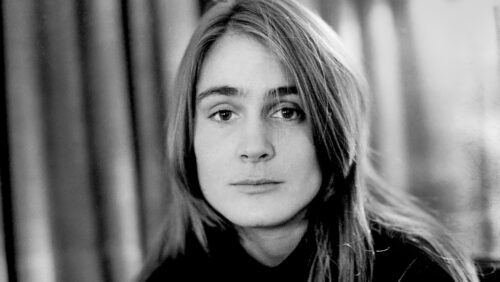 Photo: Unknown photographer
Photo: Unknown photographer
Download
Loading...
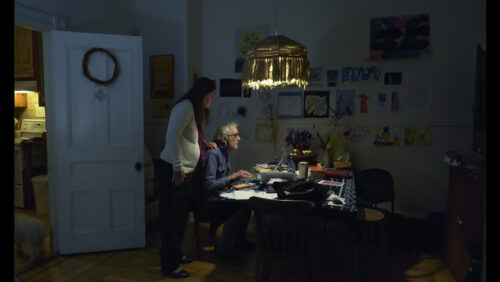 Photo: Jeremiah Hayes
Photo: Jeremiah Hayes
Download
Loading...
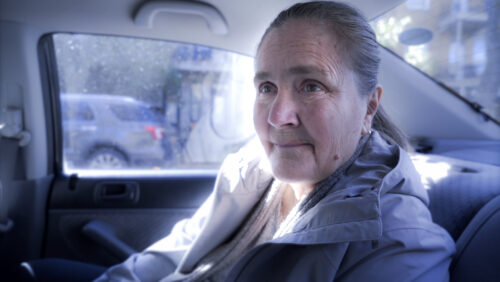 Photo: Jeremiah Hayes
Photo: Jeremiah Hayes
Download
Loading...
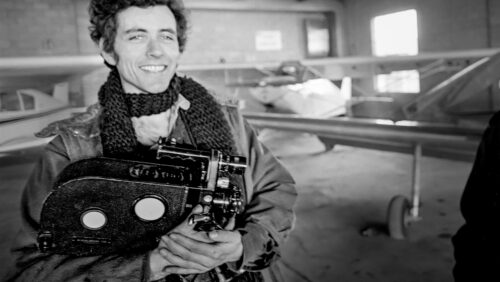 Photo: John Walker
Photo: John Walker
Download
Loading...
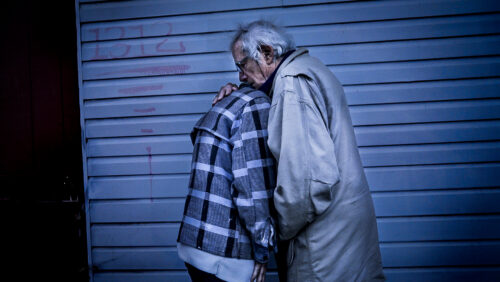 Photo: Jeremiah Hayes
Photo: Jeremiah Hayes
Download
Loading...
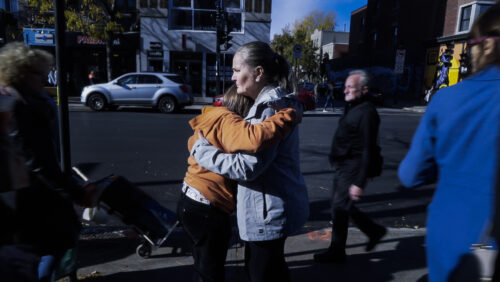 Photo: Jeremiah Hayes
Photo: Jeremiah Hayes
Download
Loading...
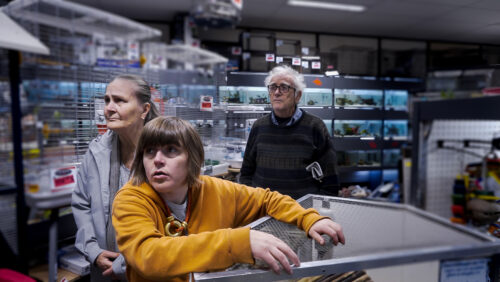 Photo: Jeremiah Hayes
Photo: Jeremiah Hayes
Download
Loading...
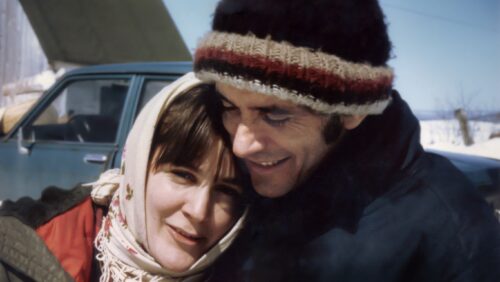 Photo: Martin Duckworth
Photo: Martin Duckworth
Download
Loading...
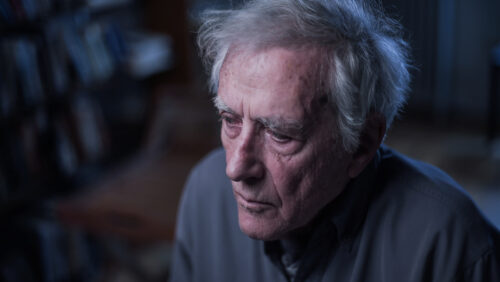 Photo: Jeremiah Hayes
Photo: Jeremiah Hayes
Download
Promotional Materials
Filmmaker Bio
Jeremiah Hayes
Director and Producer
Photo
Photo : Ai Umeda
André Barro
Producer
Photo
Annette Clarke
Producer and Executive Producer
Photo
Photo : Dave Howells
Glen Salzman
Executive Producer
Photo
Pablo Salzman
Executive Producer
Photo
Katherine Buck
Executive Producer
Photo
Photo : Not available
Credits
Directed by
Jeremiah Hayes
Produced by
Jeremiah Hayes
André Barro
Annette Clarke
Written & Edited by
Jeremiah Hayes
Cinematography & Location Sound by
Jeremiah Hayes
Music Composition by
Walker Grimshaw
Music Played by
Flute and Clarinets
Patricio Böttcher
Bassoon
Eric Heidbreder
Viola
Nelson Moneo
Cello
Samuel Bisson
Vocals
Andrew McLeod
Sound Design by
Mélanie Gauthier
Visual Effects Supervisor & Animation Director
Joshua Sherrett
Animation by
Dan Buller
Joshua Sherrett
Animation Post Producer
Yasmine Amor
Co-Written by
Daniel Diaz
Editing Consultants
Ai Umeda
Nicola Zavaglia
Arto Paragamian
For Cineflix Productions Inc.
EVP Production & Administration
Sherri Rufh
EVP Post Production
Lynn Van Rooyen
Post Production Supervisor
Jacqueline Tam
Cineflix Marketing by
SVP, Marketing & Communications
Amber Baker
Senior Manager, Marketing & Communications
Katina Katadotis
Senior Manager, Publicity
Vanessa Marra
Archival Research by
Thea Toole
Jeremiah Hayes
Archives Courtesy of
Audrey Schirmer
AP Archive
Critical Past
Footage For Pro
Getty Images
John Walker
Kinolibrary
Marianna Rydvald
Martin Duckworth
National Archives & Records Administration
NFB Archives
Periscope Film
Watson Kintner Collection, the Penn Museum Film Archives
WPA Film Library
Swarthmore College/Medisch Comite Nederland Vietnam
Pond5
Prelinger Archive
Satu Repo
Shutterstock
Additional Music by
The Return, Seaone, Exploring
© Mark Orton Tunguska Music (BMI)
Performed by Mark Orton
The Barn (SUA_Facing_the_Truth)
© Mark Orton Tunguska Music (BMI)
Performed by Walker Grimshaw
Sunrise at Independence, New West
© Mark Orton Camp Watertown Music (ASCAP)
Performed by Tin Hat
Asterisk
© Ben Goldberg Njamin Music (ASCAP)
Performed by Tin Hat
Courtesy of BAG Production Records
Licensed by arrangement with Hans Wendl Produktion
Diminished Capacity
© Robert Burger Manners McDade Music Publishing Ltd. (PRS)
Performed by Robert Burger
Licensed by arrangement with
Manners McDade Music Publishing Ltd. and Robert Burger
Vive Solo
© Les Editions de la Bascule/Strictly Confidential (BMI) and Crammed Discs
Written & Performed by Juana Molina
Bowsprit
© Manners McDade Music Publishing Ltd (PRS) and Western Vinyl
Written by Robert Griffin Lowe, Michael Allen Muller
Performed by Balmorhea
Jack
© Songs Of Universal, Inc. on behalf of Warner-Barham Music Llc. (BMI)
Written by Rob Simonsen
Performed by Walker Grimshaw
Audrey’s Photo Journey
© Ned Bouhalassa (SOCAN)
Performed by Ned Bouhalassa
Online Editing by
Serge Verreault
Graphic Design by
Cynthia Ouellet
Jacques Bertrand Simard
Music Clearances by
Katherina Huck
Key of Harmony Music Publishing
& Ann Mayall
Re-Recording by
Isabelle Lussier
Foley Artist
Simon Meilleur
Foley Recording by
Geoffrey Mitchell
For the National Film Board of Canada
Production Supervisor
Roz Power
Technical Coordinators
Daniel Lord
Christopher MacIntosh
Digital Editing Technicians
Marie-Josée Gourde
Pierre Dupont
Patrick Trahan
Sound Technician
Bernard Belley
Senior Production Coordinator
Cheryl Murgatroyd
Studio Administrator
Leslie Anne Poyntz
Marketing Manager
Jamie Hammond
Marketing Coordinator
Jolène Lessard
Publicist
Jennifer Mair
Legal Counsel
Dominique Aubry
Thanks for the onscreen participation of
Denise Albert
Fatima Banane
Evelyne Brochu
Nicole Duong
Martin Duckworth
Marya Duckworth
Sylvia Duckworth
David Fennario
Dylan Hetherington
Natascha Thiara Rydvald
Khai Parchment
Satu Repo
Anana Rydvald
Marianna Rydvald
Michael Rubbo
Audrey Schirmer
Danielle Schirmer
Jacqueline Schirmer
Nick Schirmer
David Whiteside
Executive Producers
Katherine Buck
Annette Clarke
Glen Salzman
Pablo Salzman
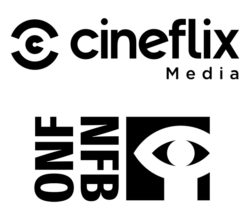
© 2021 CINEFLIX (DEAR AUDREY) INC. AND THE NATIONAL FILM BOARD OF CANADA
Media Relations
-
About Cineflix Media
Creating, producing, and distributing distinctive factual and scripted programming, the Cineflix Media group includes Cineflix Productions, Cineflix Rights, Cineflix Studios, Buccaneer Media, Connect3 Media, Husk Media, and a hub of producers from the US, UK, and Canada with whom we share strategic partnerships through joint ventures, first-look deals, and co-productions. With a catalogue of more than 5,000 hours of select programming across a wide range of genres, Cineflix is behind some of TV’s most popular and long-running shows.
-
About the NFB
Founded in 1939, the National Film Board of Canada (NFB) is a one-of-a-kind producer, co-producer and distributor of engaging, relevant and innovative documentary and animated films. As a talent incubator, it is one of the world’s leading creative centres. The NFB has enabled Canadians to tell and hear each other’s stories for over eight decades, and its films are a reliable and accessible educational resource. The NFB is also recognized around the world for its expertise in preservation and conservation, and for its rich and vibrant collection of works, which form a pillar of Canada’s cultural heritage. To date, the NFB has produced more than 14,000 works, 7,000 of which can be streamed free of charge at nfb.ca. The NFB and its productions and co-productions have earned over 7,000 awards, including 11 Oscars and an Honorary Academy Award for overall excellence in cinema.